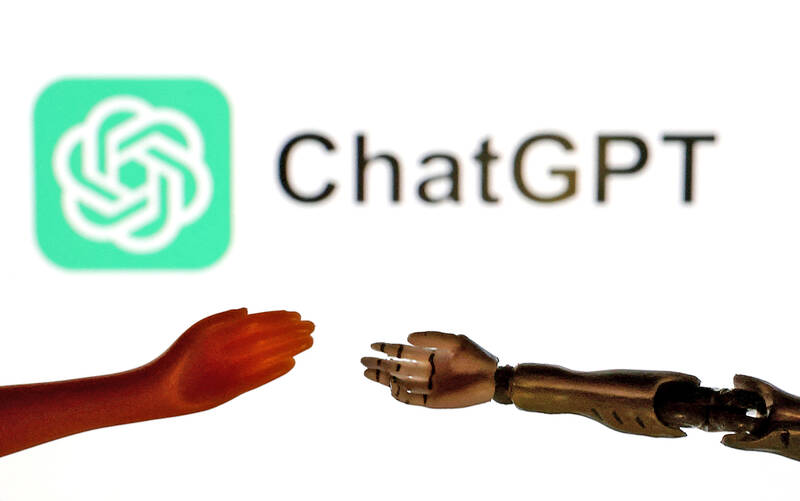OpenAI, the company behind ChatGPT, is exploring making its own artificial intelligence (AI)chips and has gone as far as evaluating a potential acquisition target, according to people familiar with the company’s plans.
The company has not yet decided to move ahead, according to recent internal discussions described to Reuters.
However, since at least lay year, it has discussed options to solve the shortage of expensive AI chips that OpenAI relies on, people said.

Photo: Reuters
These options have included building its own AI chip, working more closely with other chipmakers, including Nvidia, and also diversifying its suppliers beyond Nvidia.
OpenAI declined to comment. Its CEO, Sam Altman, has made the acquisition of more AI chips a top priority for the company. He has publicly complained about the scarcity of graphics processing units (GPU), a market dominated by Nvidia, which controls more than 80 percent of the global market for the chips best suited to run AI applications. The effort to obtain more chips is tied to two major concerns Altman has identified: a shortage of the advanced processors that power OpenAI’s software and the “eye-watering” costs associated with running the hardware necessary to power its efforts and products.
Since 2020, OpenAI has developed its generative AI technologies on a massive supercomputer constructed by Microsoft, one of OpenAI’s largest backers, that uses 10,000 Nvidia GPUs.
Running ChatGPT is very expensive for the company. Each query costs roughly US$0.04, according to an analysis from Bernstein analyst Stacy Rasgon.
If ChatGPT queries grow to one-10th the scale of Google’s search engine, it would require roughly US$48.1 billion in GPUs initially and about US$16 billion in chips per year to stay operational.
CUSTOM CHIPS ERA
An effort to develop its own AI chips would put OpenAI among a small group of large tech players such as Alphabet’s Google and Amazon.com that have sought to take control over designing the chips that are fundamental to their businesses.
It is unclear whether OpenAI would move ahead with a plan to build a custom chip. Doing so would be a major strategic initiative and a heavy investment that could amount to hundreds of millions of dollars a year in costs, according to industry veterans. Even if OpenAI committed resources to the task, it would not guarantee success. An acquisition of a chip company could speed up the process of building OpenAI’s own chip — as it did for Amazon.com and its acquisition of Annapurna Labs in 2015.
OpenAI had considered the path to the point where it performed its due diligence on a potential acquisition target, according to one of the people familiar with its plans.
The identity of the company OpenAI looked at purchasing could not be learned.
Even if OpenAI goes ahead with plans for a custom chip — including an acquisition — the effort is likely to take several years, leaving the company dependent on commercial providers like Nvidia and Advanced Micro Devices in the meantime. Some big tech companies have been building their own processors for years with limited results. Meta’s custom chip effort has been besotted with issues, leading the company to scrap some of its AI chips, according to a Reuters report. The Facebook owner is now working on a newer chip that would span all types of AI work.
OpenAI’s main backer, Microsoft, is also developing a custom AI chip that OpenAI is testing, The Information has reported. The plans could signal further distancing between the two companies.

Application-specific integrated circuit designer Faraday Technology Corp (智原) yesterday said that although revenue this quarter would decline 30 percent from last quarter, it retained its full-year forecast of revenue growth of 100 percent. The company attributed the quarterly drop to a slowdown in customers’ production of chips using Faraday’s advanced packaging technology. The company is still confident about its revenue growth this year, given its strong “design-win” — or the projects it won to help customers design their chips, Faraday president Steve Wang (王國雍) told an online earnings conference. “The design-win this year is better than we expected. We believe we will win

Intel Corp chief executive officer Lip-Bu Tan (陳立武) is expected to meet with Taiwanese suppliers next month in conjunction with the opening of the Computex Taipei trade show, supply chain sources said on Monday. The visit, the first for Tan to Taiwan since assuming his new post last month, would be aimed at enhancing Intel’s ties with suppliers in Taiwan as he attempts to help turn around the struggling US chipmaker, the sources said. Tan is to hold a banquet to celebrate Intel’s 40-year presence in Taiwan before Computex opens on May 20 and invite dozens of Taiwanese suppliers to exchange views

Chizuko Kimura has become the first female sushi chef in the world to win a Michelin star, fulfilling a promise she made to her dying husband to continue his legacy. The 54-year-old Japanese chef regained the Michelin star her late husband, Shunei Kimura, won three years ago for their Sushi Shunei restaurant in Paris. For Shunei Kimura, the star was a dream come true. However, the joy was short-lived. He died from cancer just three months later in June 2022. He was 65. The following year, the restaurant in the heart of Montmartre lost its star rating. Chizuko Kimura insisted that the new star is still down

While China’s leaders use their economic and political might to fight US President Donald Trump’s trade war “to the end,” its army of social media soldiers are embarking on a more humorous campaign online. Trump’s tariff blitz has seen Washington and Beijing impose eye-watering duties on imports from the other, fanning a standoff between the economic superpowers that has sparked global recession fears and sent markets into a tailspin. Trump says his policy is a response to years of being “ripped off” by other countries and aims to bring manufacturing to the US, forcing companies to employ US workers. However, China’s online warriors